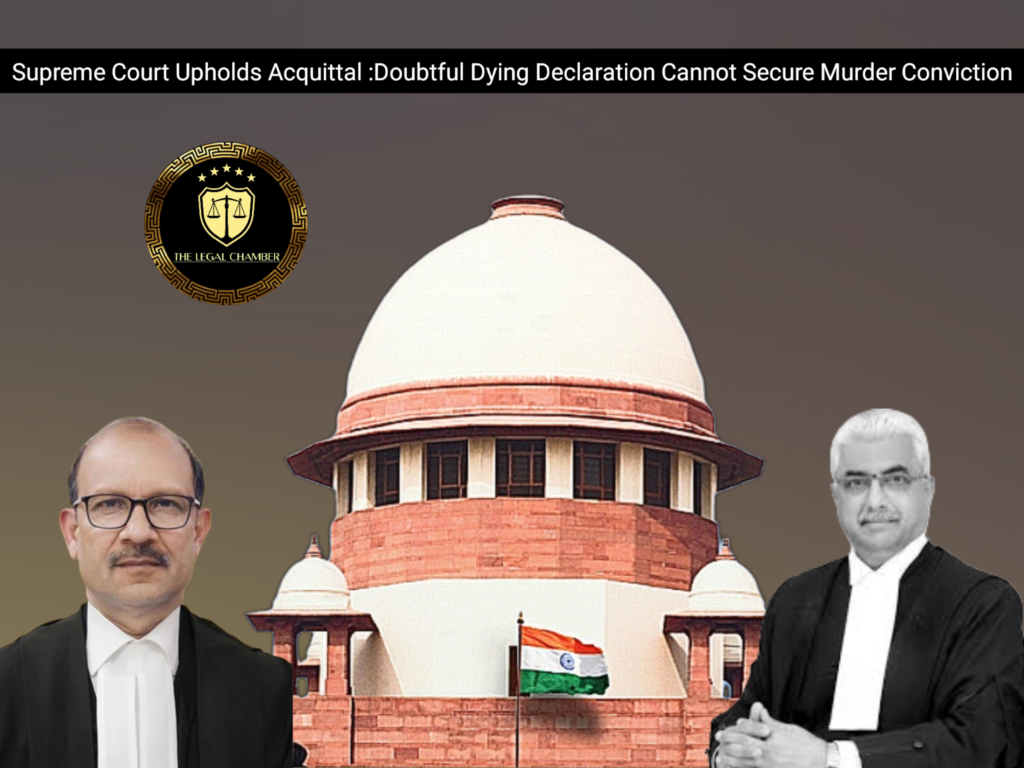
The Supreme Court upheld the acquittal, emphasizing the well-settled principle that an appellate court should not interfere with an acquittal unless the findings are perverse and the only possible view is of guilt. The Court found the prosecution’s evidence, particularly the dying declaration, unreliable due to material contradictions and the victim’s precarious medical condition, making the case fit for the application of the benefit of doubt.
Facts Of The Case:
Based on the accusation of Poona Bai (PW-10), the prosecution’s case was that on March 10, 2003, the accused-respondent, Ramveer Singh, forcibly entered their house and set her granddaughter, Badami Bai, on fire by pouring kerosene on her. The alleged motive was retaliation for a rape complaint filed against the accused’s son by Poona Bai’s son 12 days prior. The victim was taken to the hospital with severe burns. A written dying declaration (Ex. P-13) was recorded by a Naib Tehsildar (PW-8) in the presence of a doctor (PW-13), wherein she purportedly named the accused. She succumbed to her injuries a few hours after admission. The trial court convicted the accused under Sections 302 and 449 of the IPC primarily based on this dying declaration and the eyewitness account of Poona Bai. However, the High Court, and subsequently the Supreme Court, found the evidence unreliable. Both courts disbelieved Poona Bai’s eyewitness testimony. The dying declaration was doubted due to the victim’s extremely critical condition—with 100% burns, unrecordable vitals, and a feeble voice—and admissions from the official and doctor that they struggled to understand her dialect, creating grave doubt about its authenticity.
Procedural History:
The procedural history of this case began with the conviction of the accused-respondent, Ramveer Singh, by the learned Special Judge (Atrocities) and Additional Sessions Judge, Morena, on July 8, 2005, for offences under Sections 302 and 449 of the IPC. The trial court sentenced him to life imprisonment and 10 years of rigorous imprisonment, respectively. This conviction was based primarily on the evidence of a dying declaration and an eyewitness. The accused then filed a criminal appeal under Section 374(2) of the CrPC before the High Court of Madhya Pradesh at Gwalior. In its judgment dated June 22, 2010, the High Court allowed the appeal, reversed the trial court’s judgment, and acquitted the accused of all charges. The State of Madhya Pradesh, being aggrieved by this acquittal, then filed the present criminal appeal by special leave in the Supreme Court of India, which, upon hearing, dismissed the appeal and upheld the acquittal in its judgment dated July 30, 2025.
READ ALSO : Supreme Court’s Key Ruling :Notional Income of an Engineering Student Should Be Higher
Court Observation:
The Supreme Court made key observations on the unreliability of the evidence, particularly the dying declaration. It concurred with the High Court’s finding that the victim’s extremely precarious medical condition—suffering from 100% burns with unrecordable pulse and blood pressure and a barely audible voice—made it virtually impossible for a coherent declaration to be recorded. The Court further noted inherent improbabilities in the prosecution’s timeline and serious doubts arising from the admission that relatives narrated the incident to the recording officer on the victim’s behalf. It emphasized the settled legal principle that an appellate court should not interfere with an acquittal unless the findings are perverse and the only possible view is that of guilt, which was not established in this case riddled with contradictions.
Final Decision & Judgement:
The Supreme Court dismissed the State’s appeal and upheld the High Court’s judgment of acquittal. The Court found no valid or substantial reason to interfere with the acquittal of the accused-respondent, Ramveer Singh, as the prosecution case was riddled with material contradictions and inherent improbabilities, particularly regarding the reliability of the dying declaration. The impugned judgment was found to suffer from no error or infirmity warranting interference. Consequently, the appeal was found to lack merit and was dismissed, leaving the acquittal undisturbed.
Case Details:
Case Title: State of Madhya Pradesh vs. Ramveer Singh Citation: 2025 INSC 952 Criminal Appeal No.: Criminal Appeal No(s). 575 of 2014 Date of Judgement: July 30, 2025 Judges/Justice Name: Justice Aravind Kumar and Justice Sandeep Mehta
Download The Judgement Here